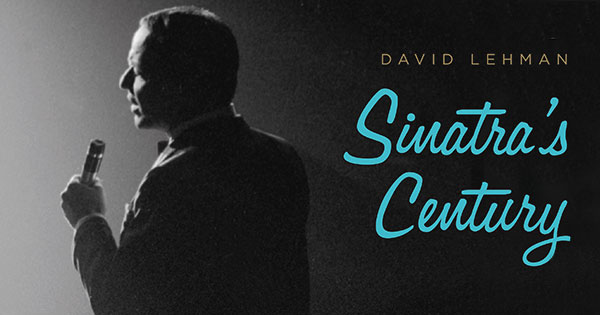
It’s been 100 years since Frank Sinatra—Chairman of the Board, La Voz, Ol’ Blue Eyes—first graced the world with his presence, and nearly 60 years since we first heard him on his debut album, The Voice of Frank Sinatra. David Lehman has marked the occasion with a collection of “one hundred notes on the man and his world,” an homage to one of the most influential musicians of the 20th century. Spanning the artist’s life and career, Sinatra’s Century offers a portrait in fragments of an American icon so sure of himself, he even smirks for his mug shots.
It is September 9, 1945, a Sunday, and it’s a wonderful day to be alive if you’re Frank Sinatra on your way to a recording studio in Hollywood. You’re still three months shy of your thirtieth birthday and you’ve done all the things that they write songs about. You’ve got the world on a string, and you’ve set it on fire. All’s right with the world, too. One month ago the bombs fell on Hiroshima and Nagasaki, ending the war in the Pacific. The Japanese emperor said “the war situation has developed not necessarily to Japan’s advantage.” The invasion of Japan would not be necessary. And now peace was here, that elusive thing that you take for granted, like the air or the light of day, except when it is absent.
All the girls adore you. You’re so skinny that comedians joke about it the way they’ll someday joke about J-Lo’s butt, though the best line in your defense will not be uttered until you begin your tempestuous affair with Ava Gardner, years from now. When director John Ford asks Ava to explain to a skeptic what she, the apotheosis of glamour, sees in “that hundred and twenty pound runt,” Ava says, “He weighs a hundred and twenty, but a hundred and ten of those pounds are pure cock.” But that is tomorrow’s news. You will never have trouble getting the attention of the news media, from Walter Cronkite (“Mr. Believable”) and The New Yorker to the tabloids of many cities around the globe. You will be the subject of biographies, hagiographies and hack jobs, documentaries and docudramas, gossip columns, FBI reports, conspiracy theories, high-toned essays of musical appreciation—the hero or villain of many romans à clef and of books in every genre, from Why Sinatra Matters to Sinatraland to The Gospel According to Frank. Someday a serious scholar will contend that “I’ll Be Seeing You,” one of your signature songs, was, in addition to being more popular in wartime than T. S. Eliot’s Four Quartets, at least arguably a superior aesthetic experience. …
You wear those big floppy bow ties—Nancy’s idea for concealing your prominent Adam’s apple—and you had to laugh reading in the New York Times about the fashion trend you started, and how one male fashion editor growled that the reason for the growing demand for bow ties “wasn’t Sinatra, you can be sure of that,” it was just that men “got tired of wearing the same old ties.” Ha. You wanted to outdo Bing, and you’re on your way.
From Sinatra’s Century by David Lehman Copyright © 2015 by David Lehman. Reprinted courtesy of Harper, an imprint of HarperCollins Publishers.

